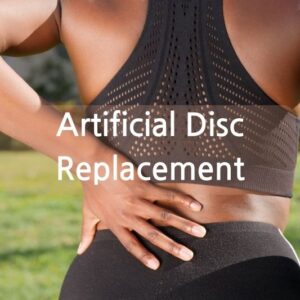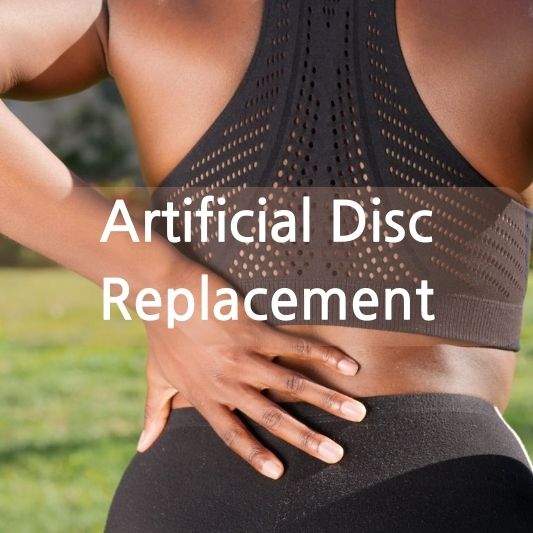Artificial disc replacement (ADR) :The spine is made up of a series of bones called vertebrae that are stacked on top of each other. The discs that sit between the vertebrae act as cushions and allow the spine to move. When a disc is damaged, it can cause pain, stiffness, and a loss of mobility.
Artificial disc replacement (ADR) is a surgical procedure that replaces a damaged disc with an artificial disc. The artificial disc is designed to mimic the function of a natural disc, allowing the spine to move and reduce pain.

Advantages of Artificial disc replacement(ADR)
ADR has several advantages over traditional spinal fusion surgery.
- It preserves spinal motion.
- It provides better pain relief.
- It has a lower risk of recurrence.
Indications for Artificial disc replacement (ADR)
ADR may be considered for people who have:
- Failed non-surgical treatments, such as medication and physical therapy.
- Severe disc damage that requires spinal fusion.
- Spinal problems that are causing pain in young people.
Procedure
ADR is usually performed under general anesthesia. The surgery typically takes about 2-3 hours.
The procedure involves the following steps:
- A small incision is made in the spine.
- The damaged disc is removed.
- The artificial disc is inserted.
- The incision is closed.
Complications
As with any surgery, ADR can have complications, including:
- Infection
- Bleeding
- Nerve damage
- Failure of the artificial disc
Postoperative care
After ADR, you will need to rest in bed for 2-3 days. You should avoid lifting heavy objects for about 1 week. You should also avoid strenuous activity for about 2-3 months.
ADR is a promising treatment option for people with spinal disorders. It can help to relieve pain, improve mobility, and restore function.
Conclusion
Artificial Disc Replacement (ADR) offers a compelling alternative to traditional spinal fusion surgery for select patients suffering from pain and dysfunction due to damaged discs. By preserving spinal motion, providing excellent pain relief, and boasting a lower risk of recurrence, ADR can significantly improve quality of life for eligible individuals. While potential complications should be carefully considered, the advantages of ADR make it a valuable treatment option for those seeking to restore spinal health and regain lost mobility.
The decision to undergo ADR should be made in consultation with a qualified healthcare professional after careful evaluation of individual circumstances and medical history.
FAQs
Q: Am I a candidate for ADR?
A: Your doctor will assess your eligibility for ADR based on factors such as the severity of your disc damage, your overall health, and your activity level.
Q: What are the long-term outcomes of ADR?
A: Studies have shown that ADR can provide long-lasting pain relief and improved function for many patients. The artificial discs used in ADR are designed to last for many years.
Q: What are the risks of ADR?
A: As with any surgery, there are risks associated with ADR, such as infection, bleeding, nerve damage, and failure of the artificial disc. However, the risk of complications is relatively low.
Q: How long is the recovery period after ADR?
A: The recovery period after ADR varies from person to person. Most people are able to return to their normal activities within a few months.
Q: How much does ADR cost?
A: The cost of ADR varies depending on factors such as your location, the surgeon, and the type of artificial disc used.
Q: What are the alternatives to ADR?
A: The main alternative to ADR is spinal fusion surgery. Spinal fusion surgery involves fusing two or more vertebrae together, which can reduce pain but also limits motion in the spine.
Q: How can I find a qualified surgeon to perform ADR?
A: You can ask your doctor for a referral to a qualified surgeon. You can also search for surgeons who specialize in ADR online.
Q: What questions should I ask my doctor about ADR?
A: Some questions you may want to ask your doctor include:
- Am I a candidate for ADR?
- What are the risks and benefits of ADR?
- What are the long-term outcomes of ADR?
- What is the recovery period like?
- How much does ADR cost?
- What are the alternatives to ADR?
- What are your qualifications and experience in performing ADR?
Find out the price of nutritional supplements to help with joint health on iHerb!
